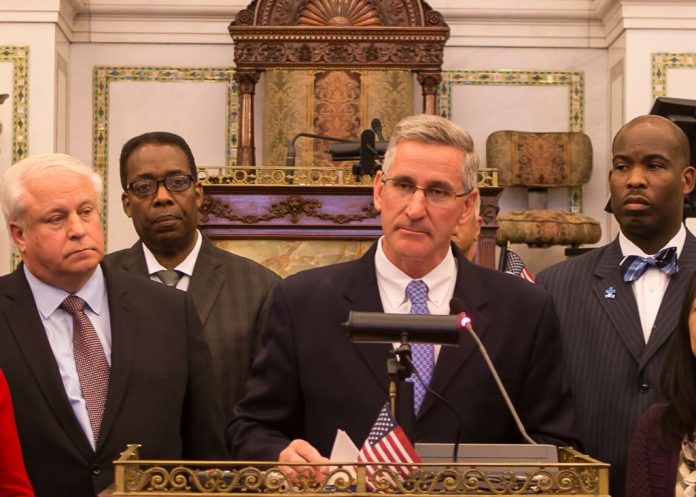Farm fresh: Pennsylvania Department of Agriculture Secretary Russell Redding speaks in City Council chambers with (from left) Councilmen Al Taubenberger, Darrell Clarke and Derek Green. SOURCE: PHILADELPHIA CITY COUNCIL
City Council’s resident agronomist wants Philadelphia to become a world leader in the innovative field of urban farming. On April 28, Councilman Al Taubenberger introduced two resolutions that call for greater governmental support for so-called “vertical farming” and its expansion in the city.
“The future is here. The world’s food supply is being strained to the limit. As the world’s population continues to expand, the demand for new sources of food — especially safe, nutritious, sustainable food sources — will grow commensurate with the population,” Taubenberger said during a news conference that also featured Pennsylvania Agriculture Secretary Russell C. Redding, Council President Darrell Clarke and other council members.
“Vertical farming is an incredible development. Fresh, pesticide-free vegetables and herbs are grown indoors in inner cities in trays stacked floor to ceiling, with nothing more than nutrient-enriched water and artificial light.”
Vertical farms grow produce year-round in stacked rows without natural sunlight or soil in half the time it takes a traditional farm. These indoor farms use artificial lighting, climate control and, in many cases, hydroponics.
Locally, Metropolis Farms has established the city’s first indoor vertical farm inside a brick warehouse in South Philadelphia. Taubenberger, who holds a bachelor of science degree in agronomy from Penn State University, toured Metropolis with its president and co-founder, Jack Griffin, and became convinced that vertical farming could become increasingly important as a source of nutritious, pesticide-free produce and as a growth industry that could employ hundreds of workers in the city.
Philadelphia, with its high number of empty warehouse spaces and wealth of colleges and universities, is well-positioned to become an international training hub for this industry, Taubenberger believes.
“Philadelphia has the available infrastructure, the world-class institutions of higher learning and the homegrown expertise to establish our city as the international center for vertical farming,” he said. ••





